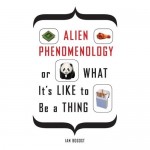 That was quick. No sooner do I say:
That was quick. No sooner do I say:
On further reflection, I suppose there’s some long-term risk that by focusing on human-centricity I’m making a Ptolemaic error. Maybe at some point we’ll realize that information is the central concern of the universe, and we humans are just a particularly narcissistic arrangement of information quanta.
Than I come across Ian Bogost’s new book, Alien Phenomenology:
Humanity has sat at the center of philosophical thinking for too long. The recent advent of environmental philosophy and posthuman studies has widened our scope of inquiry to include ecosystems, animals, and artificial intelligence. Yet the vast majority of the stuff in our universe, and even in our lives, remains beyond serious philosophical concern.
In Alien Phenomenology, or What It’s Like to Be a Thing, Ian Bogost develops an object-oriented ontology that puts things at the center of being—a philosophy in which nothing exists any more or less than anything else, in which humans are elements but not the sole or even primary elements of philosophical interest. And unlike experimental phenomenology or the philosophy of technology, Bogost’s alien phenomenology takes for granted that all beings interact with and perceive one another.
Not sure if this will change anything for me, but I’m open to the journey. Click.
Tags: bogost, human-centered design
